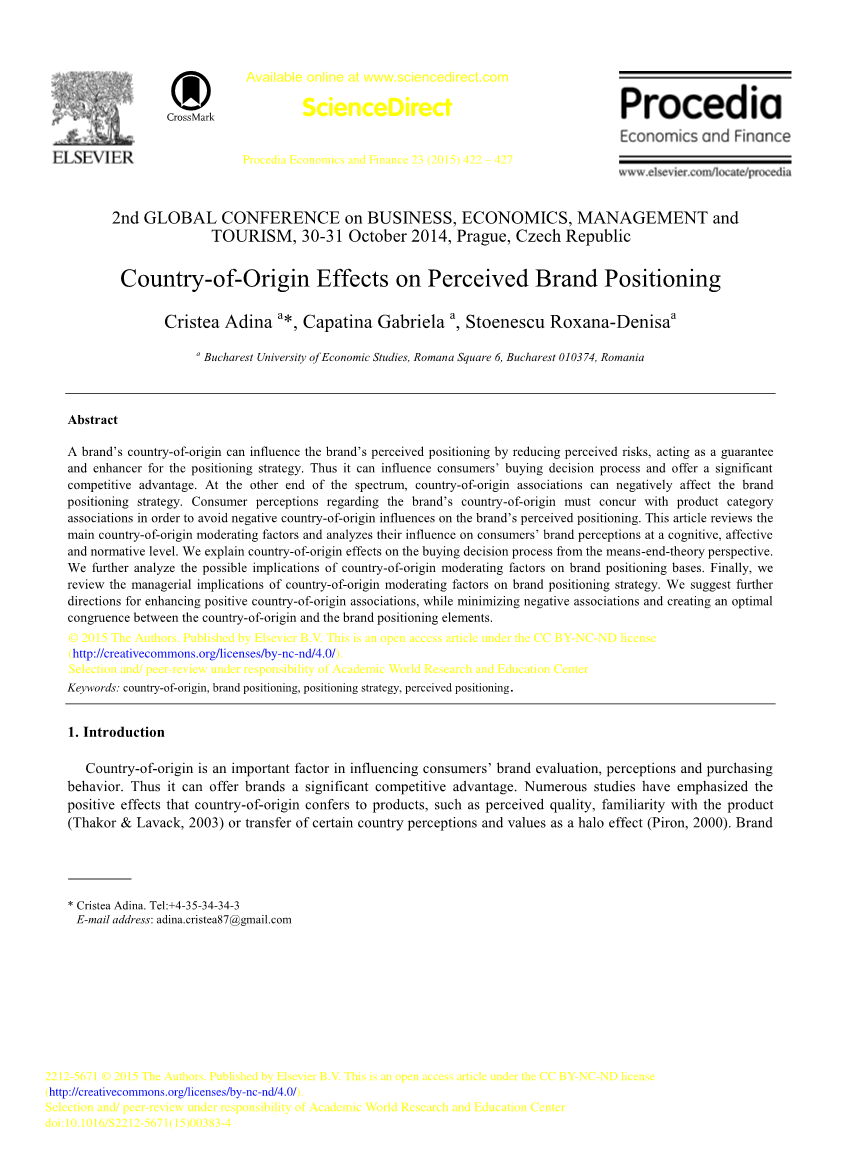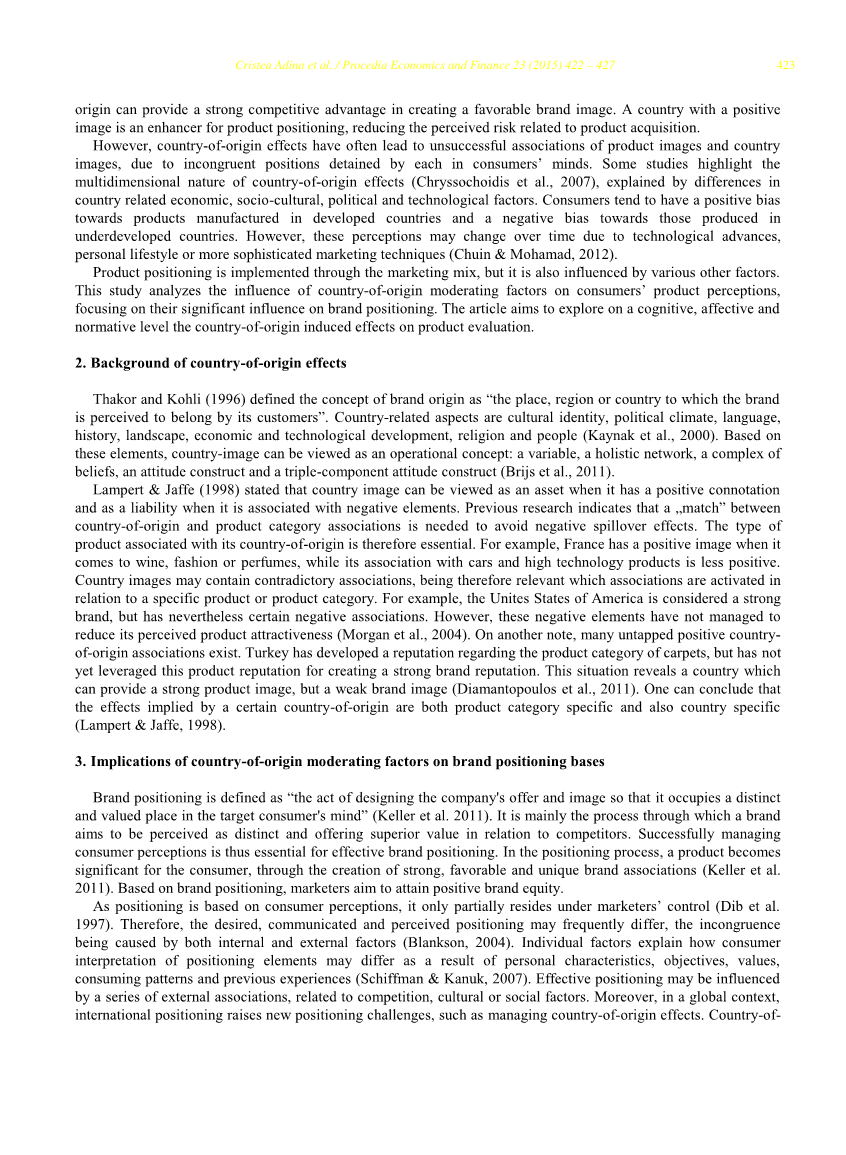

英语原文共 6 页,剩余内容已隐藏,支付完成后下载完整资料
Country-Of-Origin Effects on Perceived Brand Positinoning
原产地效应对品牌定位的影响
Abstract
摘要
A brandrsquo;s country-of-origin can influence the brandrsquo;s perceived positioning by reducing perceived risks, acting as a guarantee and enhancer for the positioning strategy. Thus it can influence consumersrsquo; buying decision process and offer a significant competitive advantage. At the other end of the spectrum, country-of-origin associations can negatively affect the brand positioning strategy. Consumer perceptions regarding the brandrsquo;s country-of-origin must concur with product category associations in order to avoid negative country-of-origin influences on the brandrsquo;s perceived positioning.This article reviews the main country-of-origin moderating factors and analyzes their influence on consumersrsquo; brand perceptions at a cognitive, affective and normative level. We explain country-of-origin effects on the buying decision process from the means-end-theory perspective. We further analyze the possible implications of country-of-origin moderating factors on brand positioning bases. Finally, we review the managerial implications of country-of-origin moderating factors on brand positioning strategy. We suggest further directions for enhancing positive country-of-origin associations, while minimizing negative associations and creating an optimal congruence between the country-of-origin and the brand positioning elements.
原产地效应作为品牌定位策略的保障以及增强因素,可以通过降低感知风险来影响品牌的感知定位,从而影响消费者的购买决策过程, 提供竞争优势。但消费者对品牌原产国的看法必须与产品类别关联一致,否则将对品牌感知定位产生负面的原产国影响,所以从另一角度来说, 原产地效应也可能会对品牌定位策略产生负面影响。本文回顾了原产地效应的主要影响因素, 并从认知、情感和规范层面分析了它们对消费者品牌认知的影响,从手段-目的理论的角度解释了原产地效应对购买决策过程的影响,进一步分析了原产地效应的影响因素可能对品牌定位产生的影响,最后, 回顾了原产地影响因素对品牌定位策略的管理涵意。我们建议进一步增强积极的原产地联想,同时尽量减少消极的联想, 并在原产地和品牌定位因素之间建立最佳的一致性。
- Introdution
- 研究背景
Country-of-origin is an important factor in influencing consumersrsquo; brand evaluation, perceptions and purchasing behavior. Thus it can offer brands a significant competitive advantage. Numerous studies have emphasized the positive effects that country-of-origin confers to products, such as perceived quality, familiarity with the product (Thakor amp; Lavack, 2003) or transfer of certain country perceptions and values as a halo effect (Piron, 2000). Brand origin can provide a strong competitive advantage in creating a favorable brand image. A country with a positive image is an enhancer for product positioning, reducing the perceived risk related to product acquisition.
原产国是影响消费者品牌评价、认知和购买行为的重要因素,因此,它可以为品牌提供明显的竞争优势。许多研究都强调了原产国对产品的积极影响,如感知质量、对产品的熟悉程度(Thakor amp; Lavack, 2003年)或将某些国家的观念和价值观转移为光环效应(Piron, 2000年)。品牌来源可以为品牌建立良好的形象提供巨大的竞争优势,一个积极的国家形象是产品定位的增强剂, 可以降低与产品相关的感知风险。
However, country-of-origin effects have often lead to unsuccessful associations of product images and country images, due to incongruent positions detained by each in consumersrsquo; minds. Some studies highlight the multidimensional nature of country-of-origin effects (Chryssochoidis et al., 2007), explained by differences in country related economic, socio-cultural, political and technological factors. Consumers tend to have a positive bias towards products manufactured in developed countries and a negative bias towards those produced in underdeveloped countries. However, these perceptions may change over time due to technological advances, personal lifestyle or more sophisticated marketing techniques (Chuin amp; Mohamad, 2012).
然而,由于消费者的国籍不同,其立场也不同,原产地效应常常会使得产品形象和国家形象关联失败。一些研究强调,原产国效应由于与国家相关的经济、社会文化、政治和技术因素不同,导致其具有多层面性质(Chryssochoidis等人, 2007年)。对于发达国家的产品,消费者往往会持有积极的态度,而对于不发达国家的产品,消费者则会持有偏见。随着技术进步、个人生活方式以及更加多元的营销手段, 这些观念可能会慢慢改变(Chiin amp; Mohamad, 2012年)。
Product positioning is implemented through the marketing mix, but it is also influenced by various other factors. This study analyzes the influence of country-of-origin moderating factors on consumersrsquo; product perceptions, focusing on their significant influence on brand positioning. The article aims to explore on a cognitive, affective and normative level the country-of-origin induced effects on product evaluation.
产品定位是通过营销组合来实现的,但也受到其他各种因素的影响。本研究分析了原产国影响因素对消费者产品感知的影响,重点分析了其对品牌定位的重要影响,旨在从认知、情感和规范三个层面探讨原产国因素对产品评价的影响。
2.Background of country-of-origin effects
2 原产国效应的背景
Thakor and Kohli (1996) defined the concept of brand origin as “the place, region or country to which the brand is perceived to belong by its customers”. Country-related aspects are cultural identity, political climate, language, history, landscape, economic and technological development, religion and people (Kaynak et al., 2000). Based on these elements, country-image can be viewed as an operational concept: a variable, a holistic network, a complex of beliefs, an attitude construct and a triple-component attitude construct (Brijs et al., 2011).
Thakor和Kohli(1996)将品牌原产地的概念定义为“消费者认为品牌所属的地方、地区或国家”。与国家相关的方面包括文化特性、政治气候、语言、历史、景观、经济和技术发展、宗教和人民(Kaynak et al., 2000)。基于这些要素,国家形象可以被看作是一个操作性概念:一个可变的、整体的网络、复杂的信仰、一种态度结构,和一个三重成分的态度结构(Brijs等人,2011年)。
Lampert amp; Jaffe (1998) stated that country image can be viewed as an asset when it has a positive connotation and as a liability when it is associated with negative elements. Previous research indicates that a bdquo;match” between country-of-origin and product category associations is needed to avoid negative spillover effects. The type of product associated with its country-of-origin is therefore essential. For example, France has a positive image when it comes to wine, fashion or perfumes, while its association with cars and high technology products is less positive. Country images may contain contradictory associations, being therefore relevant which associations are activated in relation to a specific product or product category. For example, the Unites States of America is considered a strong brand, but has nevertheless certain negative associations. However, these negative elements have not manag
全文共32561字,剩余内容已隐藏,支付完成后下载完整资料
资料编号:[2706]


